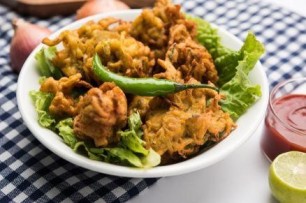Blog Details - Magma HDI

Here is the special diet to keep you fit this monsoon 27th June 2022
India is a country of diversity. Be its languages, cultures, traditions, customs, food, beverages, clothes, etc., the country provides you with a wide range of flavours linking back to the history and development of the region over time. The food palette in our country changes every hundred kilometres. And adding to the list are seasons. For every season, there are particular dos and don’ts regarding food.
The onset of the monsoon season creates a soothing vibe. The luring downpour, clouds, gentle winds, and food make the monsoon a season of endless cheerful moments. Cravings for fritters and tea are synonymous with monsoons. While oily and fried food gets our taste buds, it is also essential to be mindful about what you eat, especially during the monsoons.
This blog will discuss the dietary restrictions you must maintain to ensure you don’t fall sick. Here is the special diet to keep you fit this monsoon.
1. Oily food is a strict no:
While we all enjoy pakoras with tea in the lovely monsoon drizzles, it is not suitable for your heart and digestive system. Consuming too much oil can make it difficult for your digestive system to break down into energy-providing carbohydrates.
The excess fat can eventually be deposited in your body and, over time, cause pressure on your nerves which helps in circulating the blood. This makes it difficult for your heart to supply blood to the whole body. It can lead to severe health and heart risks.
2. Say no to spicy food:
Just like oily food, spicy food is not very gut-friendly either. It can cause indigestion due to excessive spice consumption and lead to problems like acidity, stomach ache, burns, diarrhoea, etc. Spicy food can severely impact your metabolism, slowing down the stomach’s ability to absorb all the nutrients from the food you eat.
3. Confused about leafy vegetables:
Doctors, nutritionists, and dieticians spend their entire lifetime advising their patients and clients to consume leafy greens. But you should avoid them during the monsoons. Why? The leaf moisture can cause it to go wrong, and the humidity makes germ infestation much more convenient and accessible.
If consumed in such a state, it can have severe health consequences. Apart from this, all the pesticides and insecticides might also cause some trouble due to the rain. So, to sum up, avoid eating leafy greens in the rainy season. If you still wish to consume them, ensure to wash and boil them thoroughly before cooking.
4. Be watchful about water:
If you or someone in your family consume water directly from the tap or the borewell, STOP. It would be best if you were careful about the water you drink. And stay even more watchful during the rainy season as the water might get contaminated and become unfit for consumption.
Drinking contaminated water poses high chances of diarrhoea, stomach aches, typhoid, cholera, stomach infections, and much more. Install a proper and home-friendly water treatment plant to ensure that the water you and your loved ones consume is safe to drink.
Other dietary tips include consuming tons of fluids and tea with special spices and herbs to help with sweating and the enormous humidity levels, which can cause dehydration and loss of nutrients. Consume spices like cardamom, ginger, turmeric, and cinnamon to help boost your immunity levels and combat any health issues (for example, cold and flu). Eating freshly cooked foods is another way to ensure that your diet contains all the nutrition you need during the monsoons.
Follow these tips and keep a check on your health without falling sick or suffering from any health conditions. Younger individuals tend to recover quickly due to a high metabolism rate compared to the elderly. So, it would be wise for you to purchase the best health insurance in India for parents after browsing through all the available options in the market. Find the one which caters to your needs in the best ways. Keep your parents’ health a priority.
Click HERE to know more about the best health insurance in India for parents.
Disclaimer: The information provided above is for illustrative purposes only. To get more details, please refer to policy wordings and prospectus before purchasing a policy.

